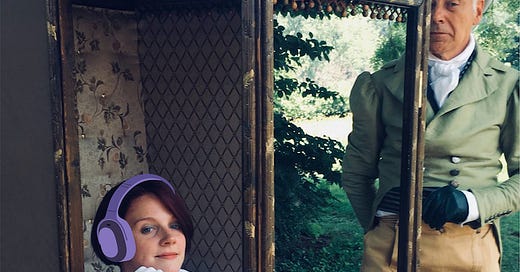Reflection: Looking back on Modern Austen
Why I started to write about my life like a narrator in a Jane Austen Novel.
I wrote my first Modern Austen entry when I was at Rutgers University. It was a diary on Medium back then. I had just discovered Jane Austen and was intrigued by how the narrators of the novels were Austen but weren’t. They occupied a space outside the world of the characters, giving them a vantage point to explain and scrutinize the choices of the characters. They could look into the minds and hearts of Austen’s heroines but still view their actions as though they didn’t have such insight.
I’ve always seen myself as a character being moved along by a narrative voice. When I was first discovering Austen in my early 20s (first Pride & Prejudice, then Emma, Northanger Abbey, and so on) it was that narrative voice I needed to help me navigate what I found baffling in my life at the time, like college relationships. In fact, that’s what my first few Modern Austen entries were about.
A boy who sat in front of me in a class on Milton showed some interest in my after we shared some witty banter, leaving a strip of paper with his phone number scratched on it on my desk as class was ending one day. He left before I even realized he’d given me his number. I remember that the handwriting and pen he used were the same as all the boys I fell for then: the handwriting distinctively and neatly indecipherable, the ink black and heavy and artful.
His name was Nick. He always wore a black t-shirt, black jeans, a (possibly) leather bomber jacket. He was super skinny, and his dark brown hair mushroomed over his head. I learned from his Facebook profile that he played guitar in a punk band.
I found it interesting that he was interested in me. I’m not saying that Mr. Darcy’s my type, but there was nothing about my appearance or person that could have made anyone think (least of all me) that we would ever work together as a couple. That’s why I texted him. I already had in my head a perfect love story about our imperfect match. I remember not being particularly impressed by his reply—he used ‘hey’ and ‘sup’ and ‘2’ in place of ‘to’—but decided not to judge him too harshly for that.
Our texts over the next week were mainly to check in on each other’s day and talk about meeting up outside of class.
In class, we were a little flirty. But he suddenly became evasive about finding a time to meet, then stopped texting or replying at all. In class, he sat somewhere else and wouldn’t even look in my direction. I was more confused than hurt—it’s not like we were ‘going out.’ I wanted answers and turned to Facebook to find them.
That’s where I learned that he was newly in a relationship with someone who certainly looked more his type. So he went from giving me his number and flirting with me to getting together with someone else and changing his relationship status on Facebook all in one week!
However confused I was by what happened, I knew that Jane Austen would be even more baffled—the text messages, the Facebook stalking, the whole concept of dating. And that’s how I decided to journal about the ridiculousness of the situation, thinking I could at least turn my confusion about college boys and dating into humor.
Throughout my 20s, I wrote more entries about relationships ending because I’m not marriage material, about online dating gone bad. When I put these diary entries on Medium, I wanted to develop this character a bit more. She became not just a 19th-century woman stuck in the 21st century, but a 19th-century woman wishing to assimilate. I was writing about a woman who wanted to embrace being single, to find a job, to have an apartment of her own. And she was disowned by her parents as a result.
Belonging neither to the 21st century nor the era of Austen, my character was left to navigate who she is without a connection to time or place. A perpetual feeling of being out of place is something I’m always working through, and I could do it through Modern Austen.
I abandoned the diary for about 2 or 3 years, getting caught up in post-university life, moving around, trying to figure out who I was and who I wanted to be. This is, of course, great material for Modern Austen, but I didn’t make time for writing like I should have.
When I returned to it—in my late 20s and into my 30s—the content I was creating took a different form. I was writing an advice column, though I’ll admit that I sometimes wrote the letters of both the advice seeker and Modern Austen. I was writing how-to guides for dealing with different aspects of being a young, single woman (with no marriage prospects). I even wrote a semi-viral essay about why Mr. Knightley loves Emma Woodhouse.
I no longer want to continue writing diary entries (though I’ll keep the Medium site as a relic) but transform Modern Austen into a magazine for Modern Heroines. It’s a space where they can seek advice and receive guidance. And I’ve moved everything to Substack to give the magazine a more intimate and personal feel.
So I hope you all enjoy and can take something away from Modern Austen. Ultimately, it’s about my respect and admiration for Jane Austen, who will always be the first name on my imaginary dinner party guest list. She helped me find myself throughout my 20s and 30s more than I’ll ever realize, and I think she can do the same for all of us.




